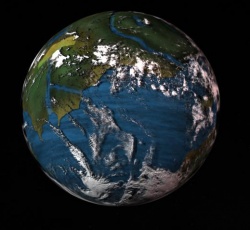
|
| Ptolomea
|
|
Mid Rim
|
|
Cocytus
|
|
Imperius
|
|
|
|
984 million km
|
|
26.35 hours
|
|
5,101.3 days
|
|
16,242.1 km
|
|
Breathable (High Levels of Oxygen, “heavy and humid”)
|
|
“Super” Tropical to Tropical to Subtropical proceeding away from Equator in either direction, temperate “cool” zones at poles. Gratuitous rainfall.
|
|
1.268g
|
- Rocky Shorelines
- Large Continents
- Mountainous Interior
- Large Tidal Floodplains
- Open Grasslands
- Temperate Forests
- Tropical Jungles
- Lakes and Rivers
- Sizable Oceans (40% of surface)
|
|
Human
|
- Primitive Humanoid Societies
- Massive Biodiversity in Wildlife
|
|
Basic
|
- 39 Million Total
- 500 million Indigenous species
|
- Almagast
- Bronato
- Tetoulichican
- Port Harbinger
- Masa Pluris
- Ft. Hammer
- Ft. Lance
- Ft. Arrow
- Darkpointe
|
- Ores
- Medicine
- Alcohol
- Technology
- Grains
|
- Military Weaponry
- Exotic Food Stuffs
- Pelts
- Meat
|
|
|
Ptolomea is the outermost planet within the Cocytus System, serving as a bastion world that is bristling with military strength. It is a planet of great beauty and hidden dangers. A perfect home planet for Caliburnus and its Sith heritage.
History
The last planet in the chain of rocky worlds, Ptolomea is physically segregated from the remainder of the Cocytus System. Originally an empty world of rock and ice, as the geological clock ticked through the eons, the planet eventually saw a burst of life from the frozen rocky soil. By chance, the world saw global temperatures rise as a faithful satellite slowly melted the surface below. Oceans grew and the atmospheric blanket settled over the sphere. In a matter of time, the barren terrain sprung forth with plant-life. Dense jungles dug deep into the heart of the landscape, hiding ages upon ages of geological history.
Around the age of the expanding Infinite Empire, Ptolomea came to be settled by humans and other humanoids. In the many millenniums that followed, societies rose and fell on the harsh jungle world. Empires controlled vast parcels of land and building many statues, temples, and other grand works. Towers and Pyramids, Sciences and Mathematics, Astronomy and Language soon sprung up out of the now native beings. Tribal Chieftains evoked the power of their knowledge and reared powerful nations.
Basic society among the Neolithic Empires was focused around the direct calculation of one astrological moment, the total alignment of Ptolomea and her two moons with their solar body. This moment unified the classical cultures in terror. Priests of nearly every cult like polytheistic religion of the time foretold of this day as the destruction of the planet and the end of all life. Generally regarded as superstition, the modern population regarded the customs and ideas of the natives as little more than primitive.
Archaeological evidence shows that at some point prior to modern colonization, visitors came to the planet and drastically changed the course of social development. In the span of several thousand years, Ptolomean natives changed structure from a geocentric view of the universe to embracing a complete structured idea of foreign organisms and life forms. In the wake of this shattering scientific revelation, their culture, which had been until then lead by the priesthood, fell into decay.
With the crumbling of the loose Empires, Ptolomea fell back into a state of relatively feral nature. As the Tribal Chieftains could no longer establish the base of control they had managed in the past, the social group size regressed into small hordes of family groups. This informational regress is often paired with the mysterious disappearance of all records pertaining to the lightsaber Caliburnus.
After many untouched generations, the Ptolomea once again saw change. A small cabal of Dark Jedi claimed the planet based on several sets of prophecies. In time, the Dark Jedi sought out the weapon Caliburnus which had come to settle on the planet. Upon this discovery, House Caliburnus was forever attached to the world which had served as the bastion for the weapon. In light of this, Clan Scholae Palatinae sought to protect the wealth and enigmas of the tropical orb.
Due in part to its inaccessibility and rough terrain, Ptolomea never served as a functional place to base the military of the Clan. However, when the Yuuzhan Vong began their siege of the world, many geographical features were changed substantially. This rough change and violent uprising left scars on the planet where the Vong had slashed through the jungles. When the world was spared, the damages done to the planet actually appeared to be beneficial in some respects. New holes in the terrain allowed for cities to spring up virtually overnight. Those holes filled with overwhelming number of refugees from the recent war. The planet, which had little or no economy prior to the invasion, had suddenly become a welcome retreat for those who were displaced. With such vast improvements, it seemed economical and wise to reap the benefits of the changes. The Clan and private corporations invested large amounts of money into the reborn Jungle world and quickly saw benefits. With a booming population, the military might of Scholae Palatinae grew exponentially.
Just as the future of Ptolomea looked its brightest, House Caliburnus, who had called it home was closed down. Along with it the direct influence of Dark Jedi on the local government. In the wake of the closure, Clan Scholae Palatinae placed a puppet government in place of the Dark Jedi who formerly held the posts. A corrupt family of autocrats was left in control, yet their true power was still from the Dark Jedi and Clan summit. This slowly saw a focus shift to output of soldiers for use by Scholae Palatinae military above all else.
After the declanning of Scholae Palatinae the influence of the Dark Jedi fell even further. The corrupt family left in control of the local monarchy had grown greedy. Taking from the planets vast resources to build their own personal wealth as statues and grand works were erected in the families name. Private corporations began to pull back funding in their research and development of new weaponry that had formerly been thriving on the planet with a deep military history. Being the base of the now House Scholae Palatinae's Expeditionary Force was all that truly kept the planet on the map.
Physical Geography
Continental
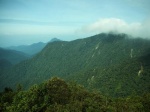 Small portion of Sword’s Edge Mountain Range
Small portion of Sword’s Edge Mountain Range
Helia
By area, Helia is the larger of the two continents present on Ptolomea. Dominating the Southern Hemisphere, Helia is a mostly wild land. With a wide variance of geographical features, Helia’s basic terrain consists of Highlands and lowland jungle. Where two of the larger tectonic plates merge, great mountains protrude from the surface, bisecting continent along a massive ridge line. This central ridge, known as the Sword’s Edge separates the Northern and Southern Coasts with nearly impassible terrain and runs nearly the entire length of the continent. Running from the Northeast Coast, the mountain range follows the Subduction Zone south towards the Polar Regions before turning sharply to the West, where it continues along the edge of the sinking subcontinent bisecting the Northern and Southern regions across the heart of the continent. With the smaller subcontinent subducting under the larger slice of land, a horseshoe shape developed in the range. At an astonishing 41,000 Kilometers long, this contiguous mountain range is certainly one great features of the Helian inland. Old and deep gorges cut through the area where mighty rivers have carved tracks. Dense forests spread across the entirety of the continent, undercut by rivers and roads. The Southern coast experiences cooler temperatures than the rest of the continent, as cool breezes whip off the seas.
The shimmering jewel of Ptolomea, Almagast, is nestled into the cool Southern Gap. The “Ivory City” protects the beaches of the Southern Coast, welcoming all within in its warm walls. The city was originally erected before the Yuzhann Vong Invasion; however it didn't bloom until the conflict had abated.
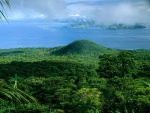 Inland jungles on Gaias
Inland jungles on Gaias
Gaias
The Second of the Major Ptolomean Continents, Gaias is the more developed parcel of land. Ancient temples and towering cities lay near the coasts, sheltered from the heat of the jungle. This continent has the benefit of the thinner northern rainforests, making development significantly easier. With a similar inland terrain to the southern continent, Gaias appears much like its sister. Old Jungle and rough ground make travel through the heart of the land extremely difficult. In contrast, in the Northwest of the landmass, open areas scarred by the Vong invasion make travel and the ballooning of Cities much easier. The majority of Ptolomea’s residents live in this area, which is often referred to as The Cradle of Amlanca. The nutrient rich soil, relatively flat landscape, and considerable climate differences allowed for the dense settlement of this region. As a result two massive cities, Bronato and Masa Pluris, stare at each other across the area. Each City boasts a population over 2.5 million, bringing the total population in the Cradle to near 20 Million people. Average Temperatures on the Gaias main range 5 to 15 degrees cooler than the highland Jungles of Helia.
Islands
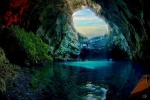 Cavern on the isolated southern coast of Marynos
Cavern on the isolated southern coast of Marynos
Marynos
Marynos lies in the Southern Hemisphere, just off the Gaiasian coast. The smallest of a discontinuous series of Islands, Marynos has little room for expansion. Primarily a fishing society, the people of the island usually associate within themselves. Abundance of natural resources has prompted the island’s leaders to declare it an independent nation. Little if any benefit could be had from the isolated Island and the residents prefer it that way. A series of caves laces the island proper, making it a haven for adventurers, criminals, and other types of miscreants.
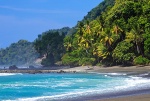 Edge of the relatively unexplored jungles of Capurnicom
Edge of the relatively unexplored jungles of Capurnicom
Capurnicom
Capurnicom is a deserted island, inhabited only by wildlife. A dominant species of mammal rules the small land mass, as master foragers in the canopy and on the jungle floors. These rodent-like creatures are known for gathering nuts and berries from their arboreal homes. Idolized on the island, few venture into the strange jungles that build their habitat. Capurnicom is also well known for beautiful expanses of beach. This island is the second largest in the set of Islands.
Cladis
The largest island in the set of independent islands, Cladis is one of the few fully explored areas of Ptolomea. A strange occurrence on the island once disrupted settlers and has been left mostly untouched by people. A folk myth tells of certain peculiarities and a strange sense of gloom on the island. The Island is unusually cool and so it shows a great difference from the rest of the Ptolomean Islands. Cool weather drastically changed the general tree type growing on the Island these oak-like deciduous trees. This chilly island holds a refreshing 70 degrees at average.
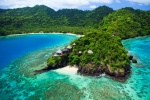 One of the many peninsulas of Ygp
One of the many peninsulas of Ygp
Ygp
Pronounced /i:dʒɪp/ or Eegip, Ygp is known as the Teacher Island, Ypp is surrounded by the Tetralibros Islands. The peninsula riddled Island provides abundant sea life and provides great protection from harsh seas. Accordingly, it is an area frequented by many people. Seen as the island getaway, Ygp has seen significant interest from the public. In the wake of the Yuzhaan Vong Invasion, a former military installation has seen significant upgrade. Named Fort Arrow by Scholae Palatinae, the Base is effectively a city. A complete Starport and a civil government define the cities importance for luring people. Average Temperatures mark this Island at a comfortably tropic 85 degrees.
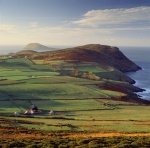 Farmlands of Scylica
Farmlands of Scylica
Scylica
Scylica is located at a midpoint in the ocean between Gaias and Helia and geologically shows traces of possibly having been a part of a land bridge between the continents at one point in the planet’s history. The terrain of the island is broken up between stretches of dense forest and cleared fields where the island’s residents work to farm livestock derived from a hardy native species of ungulate that has slowly been domesticated. The western half of the island is the more heavily populated with the city of Darkpointe keeping watch over the island.
Island Chains
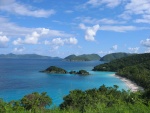 Island chain of Tetralibros
Island chain of Tetralibros
Tetralibros
Known locally as the Four Tomes, this island chain embraces the coast of Ygp. Each smaller island is known only by its relation to the larger Island. Of the Chain, West Island is the largest. Called the Tome of Power by local lore, West Island climbs from the seas on one side. Atop the magnificent cliffs, the city of Port Harbinger looks out onto the sea. The medium sized city remains flourishing in spite of its isolation. This island is said to contain traces of a hidden power that was known only to an ancient and now extinct society. South Island, called Tome of the Forgotten, is a mostly desolate Island that was ravished by the Yuzhaan Vong. East Island, associated with the Tome of Pestilence, teems with microbial life. Thick slime and marshy terrain cause the abundant growth of disease and thus give the Island its name. Finally, the North Island is known as the Tome of Solace. Little distinguishes this island from the rest of Ptolomean climates. Warm waters keep the Island habitually warm and accordingly dense jungles fill it.
Isles of Tartarus
Located southwest of Helia, this small group of three islands is actually seldom visited due to the ferocious and venomous nature of many species found only on these three islands. The three islands are named Styx, Phlegethon, and Lethe respectively. These islands saw a small amount of exploration under the interest of Rasilvenaira Kaeth StormRaven, Quaestor of House Caliburnus at the time, who encouraged study of the flora and fauna of the seemingly cursed islands to determine if any might hold some benefit to Scholae Palatinae.
Cities
 Building on the edge of the Ivory City
Building on the edge of the Ivory City
Almagast
Known as the Ivory City, Almagast is a beautiful display of functional building and elaborate architecture. As the functioning Capitol of Ptolomea, the city maintains a respectable disposition. In the decades prior to the Yuzhaan Vong invasion, the city struggled to stay alive. However, soon after the war an influx of eager refugees brought a spark to the city. In the span of less than a year, there was a functioning industry, government, and social contracts. The city soon became recognized as a model for the Ptolomean City, standing tall in the face of adversity.
The city proper is constructed of white stones and masonry, giving it an eerie ivory tint in the periods of light on the planet. Arches and buttresses are common sights in the architecture of the city, giving it a strange coral colony feeling. Approachable by sea alone, the mountainous jungles of the landscape protect it from assault. Along the glorious Mesantine Coast, brilliant white sands reciprocate the ivory tones in the city’s construction.
Many of the government buildings of the city bear the strong Coat of Arms of Scholae Palatinae, reflecting the importance that the Clan at the time had on the development of the great city. As such, all government buildings are centralized in the city, while the remainder is built around this core. Though House Caliburnus no longer exists, the Dark Jedi of Scholae Palatinae still maintain a strong influence and presence in the city.
Though not Ptolomea’s largest City, Almagast displays the travel brochure image of Ptolomea. Comfortable living is the aim of the city, at which it has excelled. When in global transit, people from the Ivory City are often seen as pretentious or snooty which is certainly a result of their lifestyle.
 Stormtroopers of the Legions of Scholae Palatinae at The Fortress
Stormtroopers of the Legions of Scholae Palatinae at The Fortress
Ft. Hammer
Nearly 50 kilometers outside of Almagast rests Ft. Hammer, a gigantic fortress looming over the Ivory City. In the mountains above the city, Ft. Hammer is in daily operation as the Expeditionary Force keep. On base are a large portion of Scholae Palatinae ground vehicles and equipment, as such it has earned its own name as The Fortress.
As the base of operations for the main offensive unit within the Legions of Scholae Palatinae, the base maintains facilities necessary to carry out its objectives and goals. In addition to the main fortress itself, attached is a full airlift base that allows for rapid deployment of troops to the fleet as needed. As well as nearby full service repair bays and personnel for the vehicles and equipment.
Routine muster drills and a vast “Live Fire” range make this a dangerous place. Strictly off limits to civilians, the major buildings of this installation are military targets. As such, point defense systems protect the base. A large number of anti-aircraft and anti-ground force cannons litter the grounds. Centralized around a large mustering yard, The Fortress is home to thousands of enlisted Stormtroopers and an additional forces of Militiamen. The militia is a crucial component of the Defense Initiative for Ptolomea, making up the bulk of its infantry numbers. Under the authoritarian power of the Quaestor of Scholae Palatinae as acting Emperor, males of adult age must serve a term of at least two years in the Militia. This rite was instituted in the early hours during the invasion of Ptolomea.
Trained in the jungles of Ptolomea, Militiamen are notoriously gruff. This attitude adds to the general air over the Fortress. The place is one for war, and everyone there knows it. Attitudes run high and fights start easily.
 One of many black markets running outside the city center of Bronato
One of many black markets running outside the city center of Bronato
Bronato
Bronato is the largest city on Ptolomea. Nestled into the fertile valley called the Cradle of Amlanca, Bronato is full of slummy undercities and has a rustic feeling about it. In an attempt to follow in the footsteps of Almagast, the founders of Bronato squandered most of the available money. This left the city in dire need of organization. Without the presence of a nearby Military Installation, Bronato is left mostly untouched by the strong arm of law and order. These factors in tandem with the poverty levels attribute the routine violence and disorder that plagues the city.
The city center boasts the majority of the limited wealth in the town. It is lavishly decorated in an intentionally old style, so as to create the appearance that the city has weathered time. Compared to Almagast, the city is not incredibly appealing. However, to the scoundrel, skig, scap, or scallywag Bronato is a great place to make money. Once outside the city center, open trade of illegal goods makes up the majority of the high yielding businesses.
In the slums, drugs and prostitution are common place. This disturbing fact often brings soldiers and even weary Dark Jedi to the city of sin. Illegal gambling, illegal death matches, and illegal racing are all popular activities in the city. Though many of the most popular activities in Bronato are illegal, police and political leaders are often involved alongside the public. Known as a generally dismal place, the city offers little for tourists but brings bounties for opportunists.
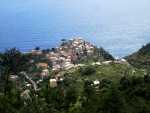 City of Port Harbinger
City of Port Harbinger
Port Harbinger
Located on the West Island of the “Four Tomes”, Port Harbinger is a resort getaway town. Eager to explore, residents of Ptolomea frequent Port Harbinger for its magnificent vistas and raw appeal. The city faces the sea, looking onto the nearby island of Ygp and is constructed on a loose model of Almagast. The city is known for swindlers and hustlers, who always frequent tourists areas. Port Harbinger offers many attractions in spite of its relatively small size and most residents of the city work in the entertainment business, drawing sustenance from passing travelers.
Beautiful beaches, a rich nightlife, great accommodations, and a wealth of adventure draw tourists like flies to a corpse. Local artisans have established their wealth to those visiting from other worlds, creating a small export of Ptolomean goods. While hardly measurable in the economic scheme of the planet, artisans are among the richest of the city’s citizens. Home of the landmark pub: Cloak & Dagger.
Masa Pluris
Primarily a frontier town, Masa Pluris is the agricultural producer of the Ptolomean cities. A large market bustles at the center of the city, luring traders and farmers alike the market at the economic center of the city. Life in Masa Pluris is simple and focused on yielding crops. Originally established as the Capital, Masa Pluris slipped behind Almagast as the cultural heart of Ptolomea and instead picked up the role as provider for its brothers and sisters around the jungle world.
Mostly content with their choices, residents of Masa Pluris are often seen as simpletons by outsiders. Subsistence farming is often a career for residents. Accordingly, few ever leave their homes. There is little interest in this city for major development despite it’s proximity to the large city of Bronato. Resting some one hundred kilometers away, Masa Pluris also calls the Cradle of Almanca home. Rich soil and resources are indicative of this region, thus Masa Pluris is well placed.
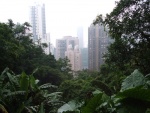 View of the Jungle City from the jungle
View of the Jungle City from the jungle
Tetoulichican
Known as the Jungle City, Tetoulichican rises up out of the dense inland forest of Helia. Located in the foothills of the massive Sword’s Edge Mountain Range, Tetoulichican feels the relief of elevation over the blistering heat of the lowland jungle. The giant stone city is guarded by archaic statues, leaving some testament to the people who came to Ptolomea before them. These stone soldiers are present throughout the cityscape, showing the innate warrior in the people who made them. Though the original origin of these sculptures is unknown, they give distinct feel to the city. When walking through the stone streets of the city, one feels transported to a much older time.
While a technologically modern city, the avenues and boulevards of the city maintain their old world feeling. Speeders, traders, businessmen, and all staples of modern metropolitan living fill the streets. A city of nearly 2 million, Tetoulichican relies primarily on trade routes from the coasts for survival. This long and arduous journey has prompted the city to begin construction on a vital lifeline to Almagast. This gigantic thoroughfare will bring new life to the Jungle City. In early stages of the construction, many personnel were lost to guerrilla attacks. In an attempt to contend with raiding parties, Tetoulichican is well policed. With a full contention of full time Militiamen and Stormtroopers, Tetoulichican is one of the more peaceful towns on Ptolomea.
The Clan’s Stormtroopers stationed in Tetoulichican are particularly well trained in guerrilla tactics and are often trained as commandos. Of these, few are selected for the Special Forces. These single men fighting units reside within the city and are revered. Special Armor sets them apart from their compatriots and allows them to disappear into the jungles around the city. Called ‘Ghosts’, these fighting units are indicative of Tetoulichican. Like the stone soldiers that protected the city for ages before, the Ghosts embody the spirit of the town.
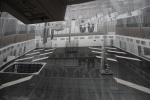 Training hanger for pilots at Ft. Lance
Training hanger for pilots at Ft. Lance
Ft. Lance
As the main operational groundside base for the Scholae Palatinae Fighter Corps, Ft. Lance shelters the newly recruited pilots. While achieving Combat Pilot status is incredibly difficult, Ensigns to the Corps run strenuous training exercises day and night. A small and busy military base, few faces remain around Ft. Lance for long.
The fort itself is built into the side of a steep cliff, sheltering it from simple assaults. A Garrison of Stormtroopers stands guard, ready at a moment’s notice ready to protect Scholae Palatinae's assets. Rigidly separated from the often cocky collage of pilots, the Legion’s Marines call this base home when not away. Rotating between thousands of other troopers stationed aboard the fleet's Star Destroyers, these warriors are just as transient as the rotating Pilot Corp. With these factors in mind, Ft. Lance is a place of perpetual change.
There is little aesthetic value to the city, whose only citizens are the soldiers. Drab gray halls and windowless rooms cause those on extended deployment to develop overwhelming symptoms of depression. With a boringly typical layout for military installations, Ft. Lance is not an attraction by any means. While this is somewhat significant, Ft. Lance holds a frightening grip on the entire Cocytus System. Known to produce the best pilots (as there is nothing to do but train), this installation is a bastion against future assailants in the system.
Ft. Arrow
Out of the remains of a military training installation, life flowed into Fort Arrow. Though little remains of the military base, the city that fed the small fortress booms on the isle of Ygp. A wide spread suburban city, Ft. Arrow takes up an extraordinary amount of space for its relatively small population. Only half a million souls call this place home, whereas up to one million are only visitors. Seen as the big town on a small island, Ft. Arrow holds a wonderful reputation among its guests.
An avid nightlife, open culture, and nude beaches draw increasing numbers of people. Such guests as Braecen Kaeth and Dakari Kaeth are known to frequent the nude beaches when time is available. Also, prostitution is legal in Ft. Arrow, undoubtedly a relic of the former military occupation. Coalitions of working class women run the sex-rings under the direct protection of the law. Though there are many other reasons, this seems to be the primary reason for male visitors to Ft. Arrow.
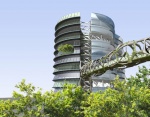 Farming installation outside of Darkpointe
Farming installation outside of Darkpointe
Although it is a tourist town, Ft. Arrow harbors dark secrets of the Scholae Palatinae's past. Protected only by blissful ignorance, the population is oblivious to its military past.
Darkpointe
Located on the western half of the island Scylica between the two larger continents, Darkpointe was founded originally as a trading hub for the farms of the island. As the importance of the foodstuffs and livestock increased the city saw a drastic upgrade in its ability to keep watch over the island operations. The size of the city has been limited by strict regulations on the available farmland of the small island preventing expansion. This has led to a very well organized city to maintain its ability to do business with the rest of the planet as populations grew.
Its name comes from its original existence on the floor of a dense jungle under the thick canopy. The shade protected the meats and produce from spoiling in the hot sun. However, as the city grew the trees were eventually replaced with more modern buildings as the city expanded. The major market center of the city is stylized as a dense jungle in tribute to the origins of its name.
Notable Landmarks
Serpent’s Vanguard
- Main article: [[Serpent's Vanguard|Serpent's Vanguard]]
The Serpent's Vanguard is located on the northern continent of Gaias, and stands watch over Ptolomea from its hilltop perch of the formidable Daggerspine Mountain range, ever vigilant against any attack upon Scholae Palatinae. While the Serpent’s Vanguard is well positioned and equipped for war, it is not without its own cultural atmosphere as well, boasting several gardens, and many leisure activities for the military personnel that call the place home.
The base of operations for the Imperial Ptolomea Guard (IPG), the Serpent’s Vanguard is comprised of the Obsidian Palace, and the various support buildings needed by the military and its members. It is far enough from any cities or settlements to provide a measure of seclusion for the operations. However, it is not truly isolated as the Vanguard possesses a major communication network that keeps the commanding officers in touch with the Grand Marshal.
Potentium Gorge
One of the few geographic landmarks on Ptolomea that is visible from space, Potentium Gorge is a gigantic crack in the crust of the planet. Carved by the hungry Dar Zhu River, Potentium Gorge reaches nearly four kilometers deep. Beginning in the Central Mountain Range of Helia, the canyon is bordered by some of the largest peaks on the planet. One such peak, Tenato Mountain, peers over the canyon from 14, 567 feet above sea level. The gorgeous vistas from the mountain are said to inspire poets and fuel other artisans.
As the canyon comes down from the mountains, it continues to cut through the flat lands of the continent. Hundreds of waterfalls dot the Dar Zhu River from headwaters to mouth. Over the 3,000 kilometer journey, the river descends 12,000 feet before spilling into the sea. Rich limestone and granite rocks give the canyon a certain sparkle over the entirety of its length.
Potentium Gorge features a steep drop off on both sides, making the climb to the river extremely tedious. Adventurers often climb down to explore the mostly untainted land. Much like Beggar’s Canyon on Tatooine, Pilots, both civilian and military, fly through the canyon at high speeds, testing their nerves as well as their skills.
Blood Forest
The Blood Forest is a dark-side rich area of jungle near the equator. Shrouded in mystery, the Blood Forest was discovered by then Quaestor Impetus Korin on her quest for the blade of Caliburnus. The Forest features extremely difficult terrain, making traversing it by vehicle or by foot extremely difficult. Few landmarks are distinguishable in the extremely dense forest. In the forest, the Skeletal remains of a Greater Krayt Dragon lie hidden along the excursion’s route to the Temple of Caliburnus.
Undoubtedly tainted by the presence of the evil weapon, the Blood Forest stinks of putrid death and is the home of many mysterious and equally dangerous creatures. Few who enter the forest ever leave. Nestled in the Northeastern portion of Helia, it is regarded as a place that should be left alone to rot. Only the brave or the extremely foolish dare to venture into the unbridled wilderness. It is bordered on the west by a nearly impassible sharp rise known as the Anima Ridge. South of the Blood Forest is the dangerous Serpentine River, named for its twisting path and its inhabitants, a particular species of aquatic serpent that is highly venomous.
Ruined Temples
One of the few landmarks on the Continent of Gaias, the Ruined Temples are the relics of a civilization that has long since passed into the Force. Though little more than weathered rocks remain, the clear outline of large temples makes this place a welcomed retreat for archeologists and treasure seekers alike. Little is known about the ruins and few artifacts have been retrieved. It is thought that this Society may have had something to do with the harboring of the Weapon Caliburnus. It is believed that many more secrets of the past lie under the overturned rocks, waiting for the right person to uncover them.
Temple of Caliburnus
The Temple of Caliburnus sits in the heart of the Blood Forest, thus making it the most unreachable spot on the planet. Known as the original resting place of the House’s namesake, this Temple complex consists of eight to ten pyramids. The largest and most central of these buildings seems to be the focal point of the extremely strong dark side energies that pool around the Temple.
Prowling the depths of the Temple halls are Guardian creatures born of the dark side. These beasts have burning red eyes, making them increasingly intimidating. Fast and voracious, the guardians can kill an unsuspecting victim without them ever being alerted to their presence. Rudimentary carvings in the temple walls warn of hundreds of other dangers, including these guardians. In some depictions, they are seen slaughtering hundreds of warriors.
In other depictions around the Temple, prophetic displays of the legendary battle for control of the lightsaber Caliburnus play out. The battle was ultimately won by Thran Ocassus who upon seizing the lightsaber, became the Quaestor of Caliburnus. In the dense undergrowth of the jungle, ancient screams still echo through the air bringing a chilling feeling about the entire complex. Though no longer the home of the Caliburnus Lightsaber, other secrets are still protected by this powerful Dark-Side temple and very few have been brave enough to seek out those secrets.
Iluvian Whorl
Where the retreating seas leave a barren tidal plain, in the middle of the sea dividing the Northern and Southern Continents, a geological marvel has occurred. Spinning like the water down a drain, the Iluvian Whorl is a chasm leading into the very heart of the planet itself. The abyss drops far beyond the depths of the rest of the sea, penetrating into the semi-viscous mantle of the planet. The anomaly is thought to help warm the planet, giving rise to the jungle heat of the land above it as well as heating the water to warm tropical temperatures. Accessible only during the periods of extremely low tide, this region is incredibly difficult to find.
Deep within the hole, a latticework of volcanic channels creates massive cave networks, spanning for hundreds if not thousands of kilometers under the surface of the planet. In the pitch black depths, explorers find themselves disoriented. When traveling by submersible, many return from expeditions delirious and in a state of psychosis. Rumors of leviathans, beasts of the deep, make there way to the fishing villages around the area in frequent numbers making this area full of superstition and lore. While these stories are dismissed by the majority of the population, some truth lies in all legends.
Podium Mount
A plateau-like mountain on the Northern Continent. Podium Mount rises 10,000 feet in a straight vertical column of volcanic remains. The mountain is a magnificent geological feat, unlike any of the surrounding peaks. Believed to be the remains of a once active Supervolcano, all that remains is a pillar of weathered rock.
Home to a several specific breeds of predatory birds, the mountain bears surprising biodiversity. Aggressive Raptors threaten all who dare venture close enough to one of the thousands of nests placed in the sides of the mountain. Said to grant great spiritual power to those who conquer it, Dark Jedi will often attempt to complete the arduous climb alone. Skill, courage, and self centeredness are required to surmount the Mountain’s apex.
Mesantine Coast
Of the thousands of miles of beach present on Ptolomea, the Mesantine Coast is surely the most beautiful. The along the southern most edge of the Helian Super continent, nearly 15 thousand kilometers of unscathed virgin beaches decorate the Jungle landscape. Brilliant sands of varying colors set this beach system apart from the others. In the East, pasty white sands bid farewell to the setting sun each day. Conversely, in the west dark red and brown sands bring an eerie feeling to the jungles that loom behind the beach. Almagast, which lies near the center of the elaborate coastline, features wonderful ivory colored sand. Differences in mineral concentration create this elaborate difference in sand tones.
Just off the shore, an immense barrier reef harbors unimaginable amounts of sea life. Brilliant Tropical fish make there home in the coral reefs, flourishing in the ever present light. This biomass has developed in such a way that corals are able to sustain both exposure to air and the extreme pressures of depth. In periods of extremely low tide, elaborate labyrinths of coral caves protrude from the surface of the sea. The home for millions of species, sea birds make up the bulk of visible lifeforms at Low tide. As the scavengers search for crustaceans and other invertebrates, marine reptiles and other predators come out to feast. Surely one of the greatest exhibits of life on Ptolomea, this reef system is nearly contiguous along the entire coastline.
Spanning the greater part of the continent, the coast is widely patrolled by Clan forces. While on foot patrol, soldiers often become distracted with the paradise spending days at a time lounging on the soft sand. This frequent patrol has come to be known as ‘The Shore-leave Patrol’ due in part to the lax nature of the military activities. Reserved for seasoned veterans, beach patrolling is considered an earned rite in the Military community.
Cradle of Amlanca
This fertile stretch of land rests on the Northern continent of Gaias. As the agricultural center of the planet, frequent trading has caused rapid development of several large cities including the slummy Bronato. Nitrogen rich soil and relatively flat terrain sets this region apart from the rest of the planet. Comparatively, deep Jungle habitats feature notoriously acidic and nutrient poor soil.
With this in mind, Human settlers exploited the region for all its natural resources. The Cradle is one of the few inland areas that is open and easily accessible to people. Spanning over nearly 40,000 square kilometers, the area has nearly 6 times the population density of any other comparable tract of land on Ptolomea. The veritable lifeline for the rest of Ptolomea’s cities, the Cradle of Amlanca is one of the most valuable assets seen on the surface of the world.
Stories in and around the ancestral farming lands tell of well fed creatures growing to nearly double the size that their jungle relatives would. These creatures include sunbathing carnivorous reptiles, which spend the majority of their days basking in warm light, as well as game-fish, which during spawning season churn the rivers with millions of members. During the aquatic spawning season, the rivers draw copious amounts of life to feed on the spawning fish. As the banks of the river fill with Humans and predators alike, it is truly a sight to behold.
Horner’s Maw
Near the Islands of Tetralibros, the seas churn up a mysterious whistling noise. This noise turns inland and carries through the jungles of each island. On the Northern Island, features of nature turns this soft whistling wind into a triumphant symphony. The rock features capture the wind, turning the gentle sounds into what appears to be a group of brass players playing a delightful fanfare for any who witness it.
Upon investigation, scientist learned that this phenomenon was actually caused by a structure created by sentient beings. Appearing as a monolithic structure, the Horner’s Maw is an architectural wonder. It uses the sciences of resonance as well as sound waves to harness the normally calm winds. While the exact nature of the structure is not know, it is known that had it been built in any other location the results would not be the same.
Thought to contain some secret of the ancients, the Horner’s Maw continues to amaze and mystify those who venture into the rocky wilderness.
Jormungand Quarry and Mines
The Jormungand Quarry is a large, deep gorge that has been cut away into the bedrock of the Ptolomean surface. Rich veins of a particularly unique stone has been discovered here and was quarried exclusively for use in the construction of the Obsidian Palace, with some of the stone also being used in accent points on the Basilisk Medical and Research building, and the Bastion Regimental Barracks. The surrounding chain of mines that surround the central quarry have provided a fair supply of ores, gems, and valuable minerals, however, the geologic surveys indicate that the deposits are not rich enough to sustain continuous mining operations. In an effort to conserve and protect the resources available on Ptolomea, the Quarry and Mines are heavily monitored and strict regulations keep any one party from abusing the resource and stripping it dry too soon.
Daggerspine Mountains
Tall and jagged peaks dominate the Daggerspine range. Situated just north of the Serpent’s Vanguard, the lower foothills of the Daggerspine Mountains actually serve as protection for the headquarters of House Caliburnus. Some of the more intrepid adventurers of the House will attempt to clime the forbidding peaks, most give up before they reach the summits. Harsh winds howl through the mountains, and it is not until you reach the lower foothills near the Serpent’s Vanguard that you find significant vegetation due to the harsh conditions and barren ground of the peaks themselves.
Crystalridge Falls
The Crystalridge Falls are a magnificent chain of huge waterfalls that decorate the Crystalridge Mountains. The most unique feature of the region is that the rock that makes up the Ridge is rich in crystal content, and as the waterfalls have etched their marks upon the mountains, thousands of multicolored crystals have become exposed. When the sunlight shines into the area, the light sparkles and reflects not only off the hundreds of waterfalls but also on the countless crystals. The effect has made the Crystalridge Falls extraordinarily popular for sightseers of all sorts. However, aware that this natural wonder was also very fragile, and prone to vandalism, the government of Ptolomea set up frequent patrols and stationary monitoring stations to protect the Falls and their stunning beauty for ages to come.
Cloak & Dagger (Pub and Brothel)
Granted one square kilometer in the Port Harbinger district, at the discretion of the Emperor and Grand Marshal, to be used for an outpost under the banner of House Dorimad Sol. The House's nefarious leaders elected to expand the definition of an outpost: a position apart from the main force. The cunning and guile of Quaestor Thran Occasus - with assistance from Aedile Prajna Berkana - concluded that the position should bring great value to the traditionally Obelisk House. The value, in their mind's eye, would not be militant, but a decided advantage of information and profit.
Breaking ground along the waterfront of the district, the leaders of the House conspired to construct a massive, multi-floored building that would serve as a pub and gentleman's club. Adhering to a strict motif and Clan doctrine, the building was built not only to be an attractive storefront, but to include solid - yet hidden - military advantage should the building ever be breached. The lower floors are open to all patrons, hosting a series of bars, open spaces and the necessary dim lighting - nooks and crannies included - to hide the faces of known occupants. The next several floors act as an upper-echelon VIP experience; with the third floor serving as a barrier, or meeting ground, between the taverns female denizens and the individuals whom come to taste the local fare. The fourth floor is reserved for the girls, workers and the remaining staff necessary to operate the facility; however, at the South end of the hall resides a turbolift to the fifth, and final, level.
It is on the fifth level that business is conducted and security is monitored. The junior members of House Dorimad Sol are sent, under the command of the Dark Jedi on assignment, to collect information passed amongst patrons, bankroll the funds brought in and establish a network of spies and confidants. Ultimately, the tavern acts as a gathering place of both local and exotic patrons with access to highly guarded information. Instead of attempting to spread a network far across the stars, Thran Occasus and Prajna Berkana elected to create a hub where not only would informants come to them, but they could turn a profit on them, as well. Currently stationed as the overseer of the establishment is Dark Jedi Knight Korbin - a Coruscanti native with a flair for bashing heads when patrons become unruly.
Map
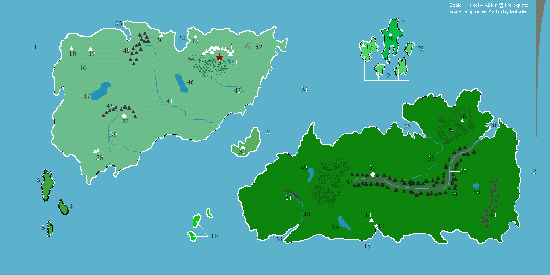
|
|
Legend
|
|
1
|
Gaias
|
2
|
Helia
|
3
|
Serpent's Vanguard
|
|
4
|
Marynos
|
5
|
Capurnicom
|
6
|
Cladis
|
|
7
|
Ygp
|
8
|
Scylica
|
9
|
Tetralibros Islands
|
|
10
|
Isles of Tartarus
|
11
|
Daggerspine Mountain Range
|
12
|
Almagast (The Ivory City)
|
|
13
|
Mesantine Coast
|
14
|
Fort Hammer
|
15
|
Podium Mount
|
|
16
|
Cradle of Amlanca
|
17
|
Port Harbinger
|
18
|
Bronato
|
|
19
|
Masa Pluris
|
20
|
Sword's Edge Mountain Range
|
21
|
Crystal Ridge Falls
|
|
22
|
Jormungand Quarry and Mines
|
23
|
Horner's Maw
|
24
|
Iluvian Whorl
|
|
25
|
Blood Forest
|
26
|
Temple of Caliburnus
|
27
|
Potentium Gorge
|
|
28
|
Ruined Temples
|
29
|
Fort Arrow
|
30
|
Fort Lance
|
|
31
|
Tetoulichican
|
32
|
Darkpointe
|
33
|
Stormcrest Bay
|
|
34
|
Golden Shield Bay
|
35
|
Hawk's Wing Bay
|
36
|
Dei'rdre Bay
|
|
37
|
Dar Zhu River
|
38
|
Zephyr Bay
|
39
|
Lunearum River
|
|
40
|
Gora River
|
41
|
Sel'ena River
|
42
|
Coshari River
|
|
43
|
Silver Breeze Mountains
|
44
|
Shadow Ridge Mountains
|
45
|
Red Talon Mountains
|
|
46
|
Runevale Lake
|
47
|
Sapphire Lake
|
48
|
Star Crystal Lake
|
|
49
|
Diabhal Lake
|
50
|
Fallengrove Pond
|
51
|
White Ash Pond
|
|
52
|
Firedon Hot Springs
|
53
|
Serpentine River
|
54
|
Arcta Borea Forest
|
|
55
|
Darkheart Forest
|
|
|
Outlook
Political
Before the days of House Caliburnus, Ptolomea was dominated by merciless empires. The primitive cultures fought for resources, honor, and domination of the jungle world. However, as these mighty empires waned, the Clan Scholae Palatinae arrived on the scene to mop up the struggling kingdoms. Known as the only inhabitants of the planet for years, House Caliburnus established a rigid political structure. In this structure, only one thing came above the House; The Clan.
The Political process falls directly under the Quaestor, as established in the Totalitarian rule of then Quaestor Thran Occasus. While the individual branches have learned to become semi-independent, all major changes and orders are received from the House Leadership. Until or unless an order were to come from the Clan Summit, the protection of Ptolomea rest solely upon its dictator. In the functional levels of government, Governors rule over the immediate public. Just as the Imperial system of Moffs operated, Ptolomea embodies the microcosm of the Imperial galaxy. Ptolomea is thus divided into 18 territories, each independently governed under the will of House and Clan.
Below each Governor, a small legislative group monitors and evaluates what would be best for their region. Below the Governor, thousands of departments monitor all aspects of life on Ptolomea. Ranging from education to the militia, each department is what ultimately controls the everyday life of a Ptolomean citizen. Funding is dispersed by the clan in limited amounts, meaning that each region is economically independent. Investing in the development of industry often builds the most income for and individual territory.
Military
Ptolomea is the Bastion world of the Cocytus System. With a large population of soldiers, one could say the planet is effectively under martial law. Military Police make the primary policing force on the planet. Without the strong arm of the Military, the planet would have fallen. Legions upon Legions of Stormtroopers call Ptolomea home. In addition to the gratuitous presence of Stormtroopers, Ptolomea is home to the Clan’s TIE Corp. Under the arm of High Admiral Thran Occasus, the TIE Corp trains constantly. In the event that the Cocytus System was invaded again, the TIE Corp would be ready for instant action.
Ptolomea seems to embody the spirit of the warrior. Under Sith Tutelage, the Military forces have spawned Ptolomean growth as well as unity under the House banner. As the primary economic force on the Planet, the Military means everything to Ptolomea. Gigantic Citadels and cities show the Military’s statues with fortuitous power. As most civilian professions somehow meet the military in one way or another, Military presence is, simply, everywhere.
See Also